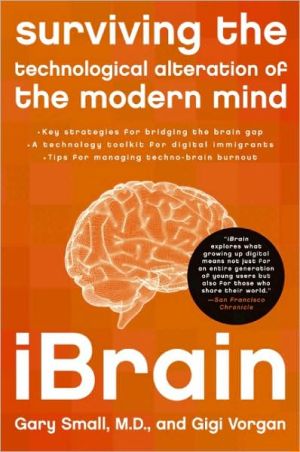iBrain: Surviving the Technological Alteration of the Modern Mind
Shaped by the era of Google and limitless access to news and information, the brains of your coworkers, your children, and your competition are remapping, retooling, and evolving. Are you keeping up?\ Dr. Gary Small, one of America's leading neuroscientists and experts on brain function and behavior, explores how technology's unstoppable march forward has altered the way young minds develop, function, and interpret information. iBrain reveals a new evolution catalyzed by technological...
Search in google:
Their insights are extraordinary, their behaviors unusual. Their brains—shaped by the era of microprocessors, access to limitless information, and 24-hour news and communication—are remapping, retooling, and evolving. They're not superhuman. They're your twenty-something coworkers, your children, and your competition. Are you keeping up? In iBrain, Dr. Gary Small, one of America's leading neuroscientists and experts on brain function and behavior, explores how technology's unstoppable march forward has altered the way young minds develop, function, and interpret information. iBrain reveals a new evolution catalyzed by technological advancement and its future implications: Where do you fit in on the evolutionary chain? What are the professional, social, and political impacts of this new brain evolution? How must you adapt and at what price? While high-tech immersion can accelerate learning and boost creativity, it also has its glitches, among them the meteoric rise in ADD diagnoses, increased social isolation, and Internet addiction. To compete and thrive in the age of brain evolution, and to avoid these potential drawbacks, we must adapt, and iBrain—with its Technology Toolkit—equips all of us with the tools and strategies needed to close the brain gap. Library Journal According to Vorgan (The Memory Bible ) and Small, one of America's leading neuroscientists, digital technology has altered the neural circuitry in human brains and triggered an evolutionary process in just one generation. The authors identify the inherent problems and challenges this poses, providing a technology toolkit filled with strategies to preserve one's humanity and keep up with the latest technology. They make their case based on abundant research in the areas of health, psychology, pediatrics, education, business, and technology. Their exercises include developing face-to-face communication skills as well as mastering electronic games. A compelling as well as timely read, this is highly recommended for all libraries.
iBrain\ Chapter One\ Your Brain is Evolving Right Now\ \ The people who are crazy enough to think they can change the world are the ones who do.\ Steve Jobs, CEO of Apple\ You're on a plane packed with other business people, reading your electronic version of the Wall Street Journal on your laptop while downloading files to your BlackBerry and organizing your PowerPoint presentation for your first meeting when you reach New York. You relish the perfect symmetry of your schedule, to-do lists, and phone book as you notice a woman in the next row entering little written notes into her leather-bound daily planner book. You remember having one of those?.?.?.?What? Like a zillion years ago? Hey lady! Wake up and smell the computer age.\ \ You're outside the airport now, waiting impatiently for a cab along with a hundred other people. It's finally your turn, and as you reach for the taxi door a large man pushes in front of you, practically knocking you over. Your briefcase goes flying, and your laptop and BlackBerry splatter into pieces on the pavement. As you frantically gather up the remnants of your once perfectly scheduled life, the woman with the daily planner book gracefully steps into a cab and glides away.\ The current explosion of digital technology not only is changing the way we live and communicate but is rapidly and profoundly altering our brains. Daily exposure to high technology...computers, smart phones, video games, search engines like Google and Yahoo...stimulates brain cell alteration and neurotransmitter release, gradually strengthening new neural pathways in our brains while weakening old ones.Because of the current technological revolution, our brains are evolving right now...at a speed like never before.\ Besides influencing how we think, digital technology is altering how we feel, how we behave, and the way in which our brains function. Although we are unaware of these changes in our neural circuitry or brain wiring, these alterations can become permanent with repetition. This evolutionary brain process has rapidly emerged over a single generation and may represent one of the most unexpected yet pivotal advances in human history. Perhaps not since Early Man first discovered how to use a tool has the human brain been affected so quickly and so dramatically.\ Television had a fundamental impact on our lives in the past century, and today the average person's brain continues to have extensive daily exposure to TV. Scientists at the University of California, Berkeley, recently found that on average Americans spend nearly three hours each day watching television or movies, or much more time spent than on all leisure physical activities combined. But in the current digital environment, the Internet is replacing television as the prime source of brain stimulation. Seven out of ten American homes are wired for high-speed Internet. We rely on the Internet and digital technology for entertainment, political discussion, and even social reform as well as communication with friends and co-workers.\ As the brain evolves and shifts its focus toward new technological skills, it drifts away from fundamental social skills, such as reading facial expressions during conversation or grasping the emotional context of a subtle gesture. A Stanford University study found that for every hour we spend on our computers, traditional face-to-face interaction time with other people drops by nearly thirty minutes. With the weakening of the brain's neural circuitry controlling human contact, our social interactions may become awkward, and we tend to misinterpret, and even miss subtle, nonverbal messages. Imagine how the continued slipping of social skills might affect an international summit meeting ten years from now when a misread facial cue or a misunderstood gesture could make the difference between escalating military conflict or peace.\ The high-tech revolution is redefining not only how we communicate but how we reach and influence people, exert political and social change, and even glimpse into the private lives of co-workers, neighbors, celebrities, and politicians. An unknown innovator can become an overnight media magnet as news of his discovery speeds across the Internet. A cell phone video camera can capture a momentary misstep of a public figure, and in minutes it becomes the most downloaded video on YouTube. Internet social networks like MySpace and Facebook have exceeded a hundred million users, emerging as the new marketing giants of the digital age and dwarfing traditional outlets such as newspapers and magazines.\ Young minds tend to be the most exposed, as well as the most sensitive, to the impact of digital technology. Today's young people in their teens and twenties, who have been dubbed Digital Natives, have never known a world without computers, twenty-four-hour TV news, Internet, and cell phones...with their video, music, cameras, and text messaging. Many of these Natives rarely enter a library, let alone look something up in a traditional encyclopedia; they use Google, Yahoo, and other online search engines. The neural networks in the brains of these Digital Natives differ dramatically from those of Digital Immigrants: people...including all baby boomers...who came to the digital/computer age as adults but whose basic brain wiring was laid down during a time when direct social interaction was the norm. The extent of their early technological communication and entertainment involved the radio, telephone, and TV.\ As a consequence of this overwhelming and early high-tech stimulation of the Digital Native's brain, we are witnessing the beginning of a deeply divided brain gap between younger and older minds...in just one generation. What used to be simply a generation gap that separated young people's values, music, and habits from those of their parents has now become a huge divide resulting in two separate cultures. The brains of the younger generation are digitally hardwired from toddlerhood, often at the expense of neural circuitry that controls one-on-one people skills. Individuals of the older generation face a world in which their brains must adapt to high technology, or they'll be left behind... politically, socially, and economically.\ Young people have created their own digital social networks, including a shorthand type of language for text messaging, and studies show that fewer young adults read books for pleasure now than in any generation before them. Since 1982, literary reading has declined by 28 percent in eighteen- to thirty-four-year-olds. Professor Thomas Patterson and colleagues at Harvard University reported that only 16 percent of adults age eighteen to thirty read a daily newspaper, compared with 35 percent of those thirty-six and older. Patterson predicts that the future of news will be in the electronic digital media rather than the traditional print or television forms.\ iBrain. Copyright © by Gary Small. Reprinted by permission of HarperCollins Publishers, Inc. All rights reserved. Available now wherever books are sold.
Acknowledgments vii1 Your Brain Is Evolving Right Now 1It's All in Your Head 4Young Plastic Brains 6Natural Selection 9Honey, Does My Brain Look Fat? 11High-Tech Revolution and the Digital Age 12Your Brain on Google 14Techno-Brain Burnout 17The New, Improved Brain 20Taking Control of Your Brain's Evolution 222 Brain Gap: Technology Dividing Generations 23Digital Natives 24Digital Immigrants 40Coming Together 463 Addicted To Technology 47Anyone Can Get Hooked 50Email Junkies 54Virtual Gaming-Bet You Can't Play Just One 56Online Porn Obsession 58Las Vegas at Your Fingertips 59Shop Till You Drop 60Getting Help 614 Technology and Behavior: ADHD, Indigo Children, and Beyond 63Driven to Distraction 64Multitasking Brains 67Indigo Children 69Can TV Trigger Autism? 71Mystery Online Illness 74Cybersuicide 76I'm Too Techy for My Brain 775 High-Tech Culture: Social, Political, and Economic Impact 79Multiple Choice 79Infinite Information 81The Electronic Marketplace 84Webonomics 85Social Networking and Entertainment 89Women vs. Men Online 91Fractured Families 92Love at First Site 95Technology and Privacy 97Cyber Crime 99I'd Rather Be Blogging 101Online Politics 102Uploading Your iBrain 1046 Brain Evolution: Where Do You Stand Now? 105Human Contact Skills 105Technology Skills 1127 Reconnecting Face To Face 115That Human Feeling 117Tech-Free Training of the Brain 120Social Skills 101 123High-Tech Addiction 146Maintaining Your Off-Line Connections 1478 The Technology Toolkit 149Making Technology Choices 150You've Got Email152Instant Messaging Right Now! 158Search Engines: Beyond Basic Google 158Text Messaging: Short and Sweet 160Mobile Phones: Smaller Is Not Always Better 161A Menu of Hand-Held Devices 163Entering the Blogosphere 165Internet Phoning and Video Conferencing 166Digital Entertainment: Swapping Hi-Fi for Wi-Fi 167Online Safety and Privacy 168Cyber Medicine 172Brain Stimulation: Aerobicize Your Mind 1789 Bridging The Brain Gap: Technology and The Future Brain 181Understanding The Gap 181Social Skills Upgrade for Digital Immigrants 184The Future Brain 186Appendix 1911 High-Tech Glossary 1912 Text Message Shortcuts and Emoticons 1993 Additional Resources 205Notes 209Index 231
\ Library JournalAccording to Vorgan (The Memory Bible ) and Small, one of America's leading neuroscientists, digital technology has altered the neural circuitry in human brains and triggered an evolutionary process in just one generation. The authors identify the inherent problems and challenges this poses, providing a technology toolkit filled with strategies to preserve one's humanity and keep up with the latest technology. They make their case based on abundant research in the areas of health, psychology, pediatrics, education, business, and technology. Their exercises include developing face-to-face communication skills as well as mastering electronic games. A compelling as well as timely read, this is highly recommended for all libraries.\ \ \








